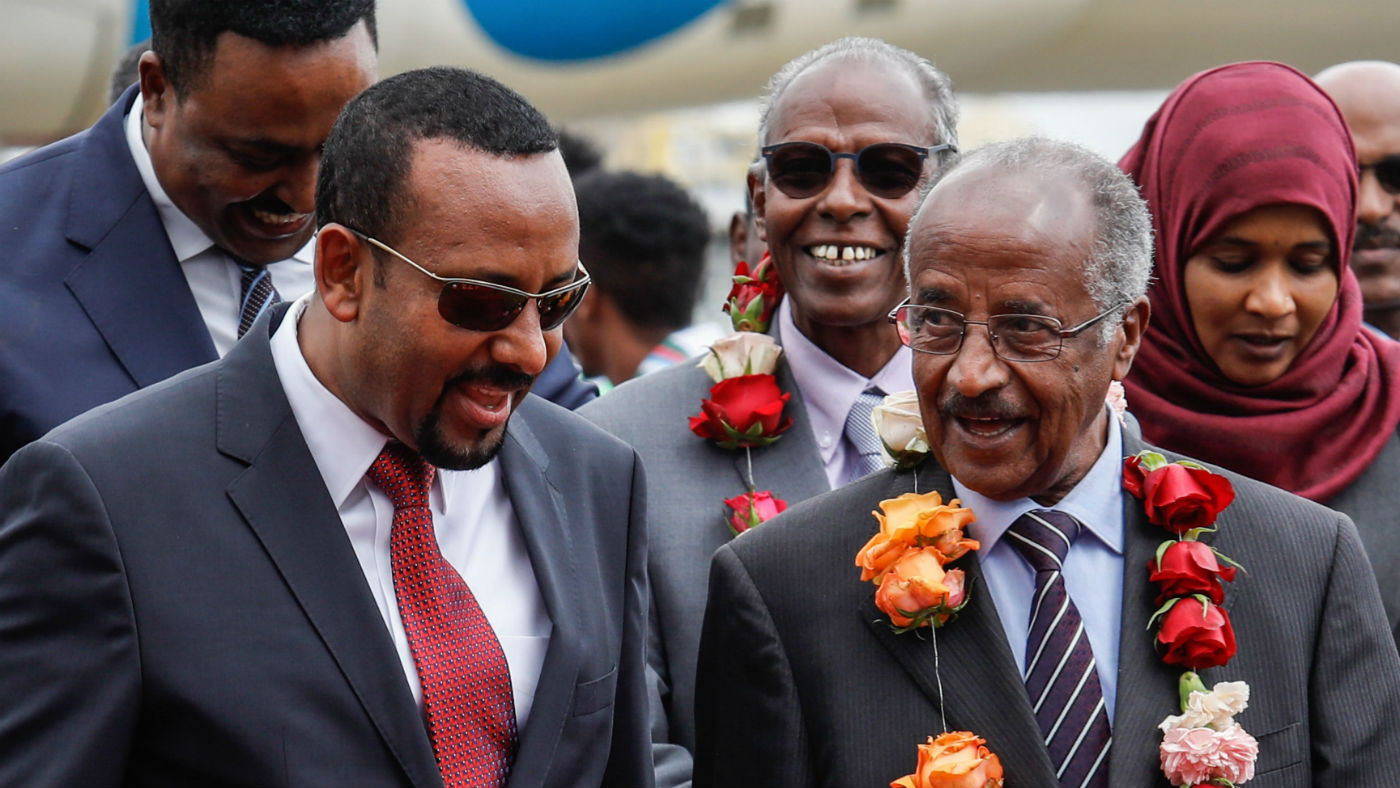Ethiopia and Eritrea end decades-long ‘state of war’
Landmark accord hailed as ‘light of hope’ for Africa by Pope Francis

A free daily email with the biggest news stories of the day – and the best features from TheWeek.com
You are now subscribed
Your newsletter sign-up was successful
Ethiopia and Eritrea have declared the “state of war” between them over, bringing an end to one of Africa’s longest-running and most intractable military stand-offs.
Ethiopia’s new Prime Minister Abiy Ahmed made the trip to meet with his Eritrean counterpart President Isaias Afwerki on Sunday. It was the first time the neighbours’ heads of state had met for nearly two decades.
Pope Francis hailed the new initiative as a “light of hope for these two countries of the Horn of Africa and for the entire African continent”.
The Week
Escape your echo chamber. Get the facts behind the news, plus analysis from multiple perspectives.

Sign up for The Week's Free Newsletters
From our morning news briefing to a weekly Good News Newsletter, get the best of The Week delivered directly to your inbox.
From our morning news briefing to a weekly Good News Newsletter, get the best of The Week delivered directly to your inbox.
Under a peace accord signed by the two leaders, both countries have agreed to open embassies, develop ports and resume flights and phone connections, “concrete signs of a stunning rapprochement that has swept away two decades of hostility in a matter of weeks”, says Reuters.
The countries have been in a state of “no war, no peace” since 2000, when a peace deal ended a brutal conflict in which 80,000 people are believed to have been killed.
A UN border commission set up under the peace agreement ruled that the town of Badme, the flashpoint for the conflict, was part of Eritrea, but Ethiopia refused to accept this and so normal relations were never resumed.
“The rivalry affected the whole region with each country normally taking opposite positions whatever the question,” the BBC says.
A free daily email with the biggest news stories of the day – and the best features from TheWeek.com
They took rival sides in Somalia's long conflict: Eritrea was accused of backing Islamist groups, while Ethiopia, a US ally, supported the internationally recognised government.
The peace deal marks a personal triumph for the 41-year-old Abiy, who swept to power in April promising a wave of reform in one of Africa’s most populous nations.
Since then he has ended a state of emergency, freed political prisoners and announced plans to partially open up the economy to foreign investors. This has led to comparisons with the 1980s-era Russian leader Mikhail Gorbachev, whose reforms led to the collapse of the Soviet Union and ended the Cold War.
But in what Reuters describes as “his boldest move”, Abiy offered last month to make peace with Eritrea, 20 years after the neighbours started a border war that killed tens of thousands of people and destabilised the region for two decades.
-
 The Week Unwrapped: Have televised confessions quelled protests in Iran?
The Week Unwrapped: Have televised confessions quelled protests in Iran?Podcast Plus, why has Elon Musk turned from Mars to the Moon? And will the BBC prove to be a puzzles champ?
-
 The week’s best photos
The week’s best photosIn Pictures An Andean god, a rogue squirrel, and more
-
 9 products to jazz up your letters and cards
9 products to jazz up your letters and cardsThe Week Recommends Get the write stuff
-
 Epstein files topple law CEO, roil UK government
Epstein files topple law CEO, roil UK governmentSpeed Read Peter Mandelson, Britain’s former ambassador to the US, is caught up in the scandal
-
 Iran and US prepare to meet after skirmishes
Iran and US prepare to meet after skirmishesSpeed Read The incident comes amid heightened tensions in the Middle East
-
 Israel retrieves final hostage’s body from Gaza
Israel retrieves final hostage’s body from GazaSpeed Read The 24-year-old police officer was killed during the initial Hamas attack
-
 China’s Xi targets top general in growing purge
China’s Xi targets top general in growing purgeSpeed Read Zhang Youxia is being investigated over ‘grave violations’ of the law
-
 Panama and Canada are negotiating over a crucial copper mine
Panama and Canada are negotiating over a crucial copper mineIn the Spotlight Panama is set to make a final decision on the mine this summer
-
 Why Greenland’s natural resources are nearly impossible to mine
Why Greenland’s natural resources are nearly impossible to mineThe Explainer The country’s natural landscape makes the task extremely difficult
-
 Iran cuts internet as protests escalate
Iran cuts internet as protests escalateSpeed Reada Government buildings across the country have been set on fire
-
 US nabs ‘shadow’ tanker claimed by Russia
US nabs ‘shadow’ tanker claimed by RussiaSpeed Read The ship was one of two vessels seized by the US military